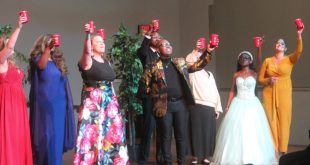Many often dream of having the opportunity to cast aside all social norms and pursuing a life in a country abroad.
Very rarely are these dreams ever realized, often because other life obligations are given precedence.
Yet visiting author Rita Golden Gelman, proves to the audiences to whom she speaks that any such dreams are not far beyond anyone’s grasp.
Gelman is the author of the book “Tales of a Female Nomad: Living at Large in the World,” a memoir of time spent as a visitor and anthropologist in cultures across the globe.
Gelman has taken upon herself to demonstrate the good that visiting other nations can do.
Gelman lived for many years as a stay-at-home mom living in Los Angeles.
She became moderately well known as a children’s book author, with over 70 books published.
In 1987, at the age of 50 and faced with a crumbling marriage, Gelman decided that she would pursue her lifelong passion of traveling to distant countries and experiencing what other cultures around the world had to offer. Thus her life as a nomad began.
“For the last 24 years I haven’t had a home,’ Gelman said. “In 1987 I divorced and said to myself ‘What are you going to do with your life?’ and my answer was ‘You’re going to live a dream.’ So I sold everything I owned and I kept several pairs of pants, a Swiss army knife and I just took off.”
“I’ve been all over the world, I still have no home, I have hardly any clothes and it’s been absolutely fabulous,” Gelman said.
Gelman’s early experiences with embedding herself in other cultures was difficult at first, but soon she learned the ins and outs of what it takes to break through to foreign societies.
“The people laughed at me at first,” Gelman said, “They couldn’t believe that I wanted to live among them in this little village. For three days all the women would run away from me and so would the kids. And then one day a woman walked over to me and asked me in Spanish ‘Where are you from?’ I told her I was from Los Angeles and then she started to cry. Her husband had gone to L.A. and had been sending home checks every week. One day instead of a check she got a letter from his boss. He had been killed in a kitchen fire and was sent home in a box.”
From that moment on, Gelman began to connect to the people of the small Zapotec village on a much deeper human level.
The same woman who had shared the story of her husband’s death took her in and taught her important lessons on how to truly blend in with another culture.
“She asked me if I would try on some of her clothes. She put a skirt over my head, a special blouse,” Gelman said. “No one in that village was wearing pants, I was, and they all had the same hand woven materials. She told me ‘I want you to wear my clothes while you’re in my village.’ So I walked out and everybody laughed when they saw me. Then they smiled and said ‘Buenos Dias.’”
With an understanding of cultural traditions, a willingness to learn, and a good dose of laughter, Gelman learned what it took to live with people who came from a vastly different background.
Throughout her life as a nomad, Gelman has visited numerous countries.
All of the countries that she has spent extended periods of time visiting are third world nations such as Guatemala, Nicaragua, Indonesia, Thailand and India.
“Fifteen percent of people have never left the North American continent,” Gelman said. “My goal right now is to get more Americans to leave. To create a population of people who have sat across breakfast tables, who have kicked a soccer ball in a field together, people who have held each other’s babies. And I thought about how I was going to make this happen and decided that the best segment of the population to work with is young American students fresh out of high school and ready to enter college.”
Gelman’s idea is to popularize and help fund the idea of a gap year for American students in the year between high school and college.
This idea is already popular with European students, but has mostly been a privilege afforded to the upper class here in America.
“I know it changes these kids. They come home and they know who they are, they have perspective and they can better choose a major,” Gelman said. “The compassion for the people they’ve met; the realization that everybody’s like them. It makes it harder to drop bombs when you come to that realization that we’re all the same.”
Gelman’s website Letsgetglobal.org talks about the benefits a gap year can have on young students. Students can also access the website through her homepage Ritagoldengelman.com.
 The Spectator The independent student newspaper of Valdosta State University
The Spectator The independent student newspaper of Valdosta State University







